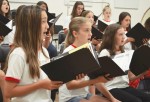A chorus of voices echoes from the recesses of Schoenberg Hall. Eyes closed and hands gesturing expressively, the members of the ensemble weave the melody together using their extensive knowledge of four-part harmony, pitch and tone.
However, none of the singers are above 17 years of age.
In September 2013, the National Children’s Chorus announced a permanent move for its L.A. chapter to Schoenberg Hall to conduct rehearsals for its upcoming concert season.
An organization tracing its origins back to 1904, the National Children’s Chorus, a collection of competitive vocal ensembles, has since opened two branches in New York City and Los Angeles and will next expand to Washington, D.C. The L.A. chapter has seven ensembles, each catering to a specific age group, from 5-year-olds in the Prelude Level ensemble to 17-year-olds in the Scholars ensemble.
Prior to the move to Schoenberg Hall, the organization’s L.A. chapter was headquartered in Saint Paul the Apostle School until its demolition.
Luke McEndarfer, artistic director of the National Children’s Chorus, said agreeing to the move to Schoenberg Hall was an easy decision because the rehearsal and practice rooms have been built to reflect state-of-the-art acoustic engineering.
McEndarfer said the move was facilitated in part by a long-standing professional relationship with Michael Dean, an associate professor and chair of vocal studies and music department chair at the UCLA Herb Alpert School of Music. Dean also gives older National Children’s Chorus members private vocal lessons to improve their musicianship.
As part of their private musical education, the recipients of the private music lessons gain privileged insight into how a collegiate music education works and are thus prepared for a life in the music industry as professionals, Dean said.
“The voice lessons that I’ve been able to give the children have been helping them in a technical way, very much the same way that the college students train,” Dean said. “Obviously, the repertoire isn’t the same level of difficulty as that of a college student, but (the students) are very aware of everything that’s going on at the collegiate level.”
Alumni of the National Children’s Chorus have been accepted to music schools such as UCLA’s Herb Alpert School of Music, the Curtis Institute of Music and The Juilliard School, and these students go on to pursue professional careers as soloists or chorus members.
This level of success is mainly because of the dedication and patience the members of the chorus display while practicing, Dean said.
“Studying voice is a very slow and gradual process, but no matter how difficult the work gets, (the students) simply recommit themselves and do their work without fail,” Dean said. “I think, sometimes, our UCLA students could learn a thing or two from them.”
The members of the chorus, from the Prelude Level to the Scholars, perform a challenging repertoire that requires commitment and full dedication, a fact mirrored in the high caliber of the programs for the upcoming concert season, McEndarfer said. The programs include a celebration of English composer Benjamin Britten’s 100th birth anniversary and a fall showcase highlighting the skills of each ensemble.
Christian Burnett, an 11-year-old sixth grader at the Wildwood School in West Los Angeles and a member of the Premier Ensemble, said the pieces tend to be intimidating at first listen.
However, the many mentors make techniques easier to understand by simplifying concepts into terms that are easy to relate to, Burnett said.
“When we’re doing the high notes, Mr. McEndarfer says to pretend that the tops of our heads are cliffs and to look over the cliffs,” Burnett said. “That’s how it kind of feels to sing a high note, you have to stretch your body to get those notes.”
However, even in a highly demanding musical environment, the members of the chorus still discover joy in the art form, said Christine Ocheltree, a 15-year-old high school student at Marlborough School in Hancock Park, Central Los Angeles, and a member of the Premier Ensemble.
Dean said he hopes the members of the National Children’s Chorus take the lessons learned throughout their musical experiences and grow to love the role music plays in their lives, whether as professionals or amateurs, in the rehearsal room or onstage.
“Singing is one of those things that is life-changing and life-affirming when you’re young,” Dean said. “As difficult as the repertoire is, all of the children seem to be having the greatest time of their lives because they know how hard they work, they know what a great job they do, and they get to see the rewards of their work right there onstage.”
